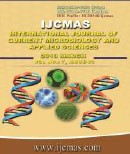


 National Academy of Agricultural Sciences (NAAS)
National Academy of Agricultural Sciences (NAAS)

|
PRINT ISSN : 2319-7692
Online ISSN : 2319-7706 Issues : 12 per year Publisher : Excellent Publishers Email : editorijcmas@gmail.com / submit@ijcmas.com Editor-in-chief: Dr.M.Prakash Index Copernicus ICV 2018: 95.39 NAAS RATING 2020: 5.38 |
The present investigation was carried out at College of Horticulture, V.R. Gudem, West Godavari district of Andhra Pradesh during the year 2014-15. Aim of the experiment was to find out the influence of soil parameters on the establishment of turfgrass species under different methods of establishment. The experiment was laid out in a factorial randomized block design with 4 turf grass species viz., Bermuda grass (Cynodon dactylon), Korean grass (Zoysia japonica), St. Augustine grass (Stenotaphrum secundatum) and Centipede grass (Erimochloa ophiuroides) planted with dibbling and turf plastering methods. Based on the results obtained it was observed that soil pH, soil porosity, soil moisture content and bulk density showed non-significant influence on the establishment of turfgrass species planted under different methods in comparison to the initial values recorded at the time of planting. However, soil electrical conductivity (EC) recorded significant influence on the establishment of turfgrass species planted under different methods. Dibbling method of planting recorded significantly highest soil EC (0.09 dS m-1) in comparison to turf plastering. Among the turf grass species evaluated Bermuda grass recorded significantly highest soil EC (0.16 dS m-1), whereas, Korean grass recorded significantly lowest soil EC (0.04 dS m-1). The interaction effect between Bermuda grass planted with dibbling method recorded significantly highest soil EC (0.18 dS m-1), whereas, Korean grass planted with turf plastering method recorded significantly lowest soil EC (0.04 dS m-1). The data pertaining to influence of major nutrients (N, P and K) on the establishment of turfgrass species under different methods of planting was found non-significant for both individual and their interaction effects.
 |
 |
 |
 |
 |